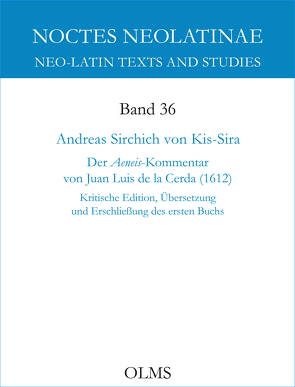
Am Ende einer Phase, in der für die Kommentierung antiker Texte die Grundlagenarbeit geleistet wird, auf die auch deren heutiges Verständnis noch aufbaut, verfasst der spanische Jesuit Juan Luis de la Cerda (1558–1643) den umfangreichsten Vergilkommentar aller Zeiten. In unglaublicher Fülle konzentriert er antikes Material, belegt darüber hinaus aber noch Deutungen unzähliger zeitgenössischer Autoren und setzt sich auch damit kritisch auseinander, was seine Arbeit zu einem unverzichtbaren Werkzeug der Vergilexegese macht.
Damals hochbedeutsam, heute weitgehend vergessen, lohnt eine Wiederentdeckung allemal: Anhand des prominentesten und meistgelesenen lateinischen Dichters, der schon fru¨h als Paradigma fu¨r eine Poetik aufgefasst worden ist, eröffnet die Untersuchung der Frage, was als kommentierungswürdig bzw. -bedürftig (oder gerade auch nicht) angesehen wird, einen tiefgreifenden Zugang zu einem Umgang mit dem Vergiltext, der sich von den modernen hermeneutischen Vorannahmen grundlegend unterscheidet.
Mit der Erschließung von la Cerdas Ausführungen zum ersten Buch der Aeneis macht diese zweisprachige Edition erstmals diesen Teil seines Werks und damit eine bedeutende Etappe der Vergilkommentierung zugänglich.****************At the close of an era, in which the foundations of the commentary tradition of ancient authors were laid, on which modern interpreters of these authors still continue to draw, the Spanish Jesuit Juan Luis de la Cerda (1558–1643) composed the most extensive Virgil commentary ever undertaken. He amassed an unrivalled collection of explanatory material from classical sources and took issue in great detail with the views and arguments of countless early modern commentators. The extraordinary breadth of his exegesis makes his commentary into a fundamental reference work even for present-day students of Virgil.
De la Cerda’s commentary was widely acclaimed in his own time, but has today largely fallen into oblivion. At the basis of this new analysis of his work lies the fundamental question what kind of interpretative issues and problems were considered indispensable in an early modern commentary on the most prominent and most-read ancient Latin poet, who served from very early on as a paradigm for the theory and practice of poetry. Special attention has been given to the differences between De la Cerda’s approach and the basic assumptions and preconceptions that inform the modern understanding of Virgil’s poetry.
This bilingual edition of De la Cerda’s commentary on Book 1 of Virgil’s Aeneid makes available for the first time this section of his exegetical work on Virgil in a state-of-the-art presentation.
Aktualisiert: 2023-06-29
> findR *
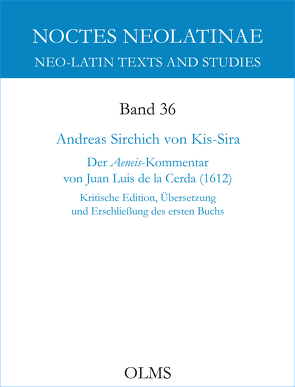
Am Ende einer Phase, in der für die Kommentierung antiker Texte die Grundlagenarbeit geleistet wird, auf die auch deren heutiges Verständnis noch aufbaut, verfasst der spanische Jesuit Juan Luis de la Cerda (1558–1643) den umfangreichsten Vergilkommentar aller Zeiten. In unglaublicher Fülle konzentriert er antikes Material, belegt darüber hinaus aber noch Deutungen unzähliger zeitgenössischer Autoren und setzt sich auch damit kritisch auseinander, was seine Arbeit zu einem unverzichtbaren Werkzeug der Vergilexegese macht.
Damals hochbedeutsam, heute weitgehend vergessen, lohnt eine Wiederentdeckung allemal: Anhand des prominentesten und meistgelesenen lateinischen Dichters, der schon fru¨h als Paradigma fu¨r eine Poetik aufgefasst worden ist, eröffnet die Untersuchung der Frage, was als kommentierungswürdig bzw. -bedürftig (oder gerade auch nicht) angesehen wird, einen tiefgreifenden Zugang zu einem Umgang mit dem Vergiltext, der sich von den modernen hermeneutischen Vorannahmen grundlegend unterscheidet.
Mit der Erschließung von la Cerdas Ausführungen zum ersten Buch der Aeneis macht diese zweisprachige Edition erstmals diesen Teil seines Werks und damit eine bedeutende Etappe der Vergilkommentierung zugänglich.****************At the close of an era, in which the foundations of the commentary tradition of ancient authors were laid, on which modern interpreters of these authors still continue to draw, the Spanish Jesuit Juan Luis de la Cerda (1558–1643) composed the most extensive Virgil commentary ever undertaken. He amassed an unrivalled collection of explanatory material from classical sources and took issue in great detail with the views and arguments of countless early modern commentators. The extraordinary breadth of his exegesis makes his commentary into a fundamental reference work even for present-day students of Virgil.
De la Cerda’s commentary was widely acclaimed in his own time, but has today largely fallen into oblivion. At the basis of this new analysis of his work lies the fundamental question what kind of interpretative issues and problems were considered indispensable in an early modern commentary on the most prominent and most-read ancient Latin poet, who served from very early on as a paradigm for the theory and practice of poetry. Special attention has been given to the differences between De la Cerda’s approach and the basic assumptions and preconceptions that inform the modern understanding of Virgil’s poetry.
This bilingual edition of De la Cerda’s commentary on Book 1 of Virgil’s Aeneid makes available for the first time this section of his exegetical work on Virgil in a state-of-the-art presentation.
Aktualisiert: 2023-06-29
> findR *
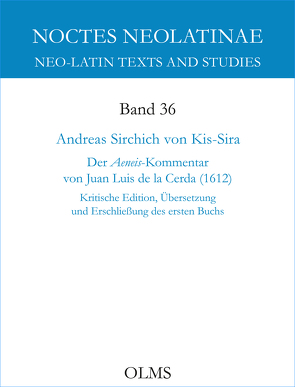
Am Ende einer Phase, in der für die Kommentierung antiker Texte die Grundlagenarbeit geleistet wird, auf die auch deren heutiges Verständnis noch aufbaut, verfasst der spanische Jesuit Juan Luis de la Cerda (1558–1643) den umfangreichsten Vergilkommentar aller Zeiten. In unglaublicher Fülle konzentriert er antikes Material, belegt darüber hinaus aber noch Deutungen unzähliger zeitgenössischer Autoren und setzt sich auch damit kritisch auseinander, was seine Arbeit zu einem unverzichtbaren Werkzeug der Vergilexegese macht.
Damals hochbedeutsam, heute weitgehend vergessen, lohnt eine Wiederentdeckung allemal: Anhand des prominentesten und meistgelesenen lateinischen Dichters, der schon fru¨h als Paradigma fu¨r eine Poetik aufgefasst worden ist, eröffnet die Untersuchung der Frage, was als kommentierungswürdig bzw. -bedürftig (oder gerade auch nicht) angesehen wird, einen tiefgreifenden Zugang zu einem Umgang mit dem Vergiltext, der sich von den modernen hermeneutischen Vorannahmen grundlegend unterscheidet.
Mit der Erschließung von la Cerdas Ausführungen zum ersten Buch der Aeneis macht diese zweisprachige Edition erstmals diesen Teil seines Werks und damit eine bedeutende Etappe der Vergilkommentierung zugänglich.****************At the close of an era, in which the foundations of the commentary tradition of ancient authors were laid, on which modern interpreters of these authors still continue to draw, the Spanish Jesuit Juan Luis de la Cerda (1558–1643) composed the most extensive Virgil commentary ever undertaken. He amassed an unrivalled collection of explanatory material from classical sources and took issue in great detail with the views and arguments of countless early modern commentators. The extraordinary breadth of his exegesis makes his commentary into a fundamental reference work even for present-day students of Virgil.
De la Cerda’s commentary was widely acclaimed in his own time, but has today largely fallen into oblivion. At the basis of this new analysis of his work lies the fundamental question what kind of interpretative issues and problems were considered indispensable in an early modern commentary on the most prominent and most-read ancient Latin poet, who served from very early on as a paradigm for the theory and practice of poetry. Special attention has been given to the differences between De la Cerda’s approach and the basic assumptions and preconceptions that inform the modern understanding of Virgil’s poetry.
This bilingual edition of De la Cerda’s commentary on Book 1 of Virgil’s Aeneid makes available for the first time this section of his exegetical work on Virgil in a state-of-the-art presentation.
Aktualisiert: 2023-06-29
> findR *
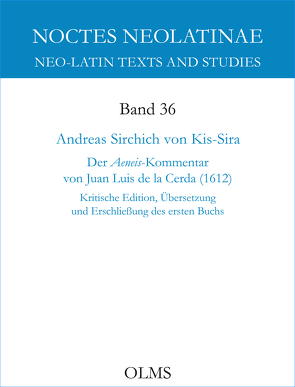
Am Ende einer Phase, in der für die Kommentierung antiker Texte die Grundlagenarbeit geleistet wird, auf die auch deren heutiges Verständnis noch aufbaut, verfasst der spanische Jesuit Juan Luis de la Cerda (1558–1643) den umfangreichsten Vergilkommentar aller Zeiten. In unglaublicher Fülle konzentriert er antikes Material, belegt darüber hinaus aber noch Deutungen unzähliger zeitgenössischer Autoren und setzt sich auch damit kritisch auseinander, was seine Arbeit zu einem unverzichtbaren Werkzeug der Vergilexegese macht.
Damals hochbedeutsam, heute weitgehend vergessen, lohnt eine Wiederentdeckung allemal: Anhand des prominentesten und meistgelesenen lateinischen Dichters, der schon fru¨h als Paradigma fu¨r eine Poetik aufgefasst worden ist, eröffnet die Untersuchung der Frage, was als kommentierungswürdig bzw. -bedürftig (oder gerade auch nicht) angesehen wird, einen tiefgreifenden Zugang zu einem Umgang mit dem Vergiltext, der sich von den modernen hermeneutischen Vorannahmen grundlegend unterscheidet.
Mit der Erschließung von la Cerdas Ausführungen zum ersten Buch der Aeneis macht diese zweisprachige Edition erstmals diesen Teil seines Werks und damit eine bedeutende Etappe der Vergilkommentierung zugänglich.****************At the close of an era, in which the foundations of the commentary tradition of ancient authors were laid, on which modern interpreters of these authors still continue to draw, the Spanish Jesuit Juan Luis de la Cerda (1558–1643) composed the most extensive Virgil commentary ever undertaken. He amassed an unrivalled collection of explanatory material from classical sources and took issue in great detail with the views and arguments of countless early modern commentators. The extraordinary breadth of his exegesis makes his commentary into a fundamental reference work even for present-day students of Virgil.
De la Cerda’s commentary was widely acclaimed in his own time, but has today largely fallen into oblivion. At the basis of this new analysis of his work lies the fundamental question what kind of interpretative issues and problems were considered indispensable in an early modern commentary on the most prominent and most-read ancient Latin poet, who served from very early on as a paradigm for the theory and practice of poetry. Special attention has been given to the differences between De la Cerda’s approach and the basic assumptions and preconceptions that inform the modern understanding of Virgil’s poetry.
This bilingual edition of De la Cerda’s commentary on Book 1 of Virgil’s Aeneid makes available for the first time this section of his exegetical work on Virgil in a state-of-the-art presentation.
Aktualisiert: 2023-06-29
> findR *
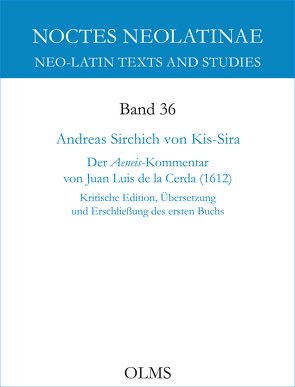
Am Ende einer Phase, in der für die Kommentierung antiker Texte die Grundlagenarbeit geleistet wird, auf die auch deren heutiges Verständnis noch aufbaut, verfasst der spanische Jesuit Juan Luis de la Cerda (1558–1643) den umfangreichsten Vergilkommentar aller Zeiten. In unglaublicher Fülle konzentriert er antikes Material, belegt darüber hinaus aber noch Deutungen unzähliger zeitgenössischer Autoren und setzt sich auch damit kritisch auseinander, was seine Arbeit zu einem unverzichtbaren Werkzeug der Vergilexegese macht.
Damals hochbedeutsam, heute weitgehend vergessen, lohnt eine Wiederentdeckung allemal: Anhand des prominentesten und meistgelesenen lateinischen Dichters, der schon fru¨h als Paradigma fu¨r eine Poetik aufgefasst worden ist, eröffnet die Untersuchung der Frage, was als kommentierungswürdig bzw. -bedürftig (oder gerade auch nicht) angesehen wird, einen tiefgreifenden Zugang zu einem Umgang mit dem Vergiltext, der sich von den modernen hermeneutischen Vorannahmen grundlegend unterscheidet.
Mit der Erschließung von la Cerdas Ausführungen zum ersten Buch der Aeneis macht diese zweisprachige Edition erstmals diesen Teil seines Werks und damit eine bedeutende Etappe der Vergilkommentierung zugänglich.****************At the close of an era, in which the foundations of the commentary tradition of ancient authors were laid, on which modern interpreters of these authors still continue to draw, the Spanish Jesuit Juan Luis de la Cerda (1558–1643) composed the most extensive Virgil commentary ever undertaken. He amassed an unrivalled collection of explanatory material from classical sources and took issue in great detail with the views and arguments of countless early modern commentators. The extraordinary breadth of his exegesis makes his commentary into a fundamental reference work even for present-day students of Virgil.
De la Cerda’s commentary was widely acclaimed in his own time, but has today largely fallen into oblivion. At the basis of this new analysis of his work lies the fundamental question what kind of interpretative issues and problems were considered indispensable in an early modern commentary on the most prominent and most-read ancient Latin poet, who served from very early on as a paradigm for the theory and practice of poetry. Special attention has been given to the differences between De la Cerda’s approach and the basic assumptions and preconceptions that inform the modern understanding of Virgil’s poetry.
This bilingual edition of De la Cerda’s commentary on Book 1 of Virgil’s Aeneid makes available for the first time this section of his exegetical work on Virgil in a state-of-the-art presentation.
Aktualisiert: 2023-06-29
> findR *

Am Ende einer Phase, in der für die Kommentierung antiker Texte die Grundlagenarbeit geleistet wird, auf die auch deren heutiges Verständnis noch aufbaut, verfasst der spanische Jesuit Juan Luis de la Cerda (1558–1643) den umfangreichsten Vergilkommentar aller Zeiten. In unglaublicher Fülle konzentriert er antikes Material, belegt darüber hinaus aber noch Deutungen unzähliger zeitgenössischer Autoren und setzt sich auch damit kritisch auseinander, was seine Arbeit zu einem unverzichtbaren Werkzeug der Vergilexegese macht.
Damals hochbedeutsam, heute weitgehend vergessen, lohnt eine Wiederentdeckung allemal: Anhand des prominentesten und meistgelesenen lateinischen Dichters, der schon fru¨h als Paradigma fu¨r eine Poetik aufgefasst worden ist, eröffnet die Untersuchung der Frage, was als kommentierungswürdig bzw. -bedürftig (oder gerade auch nicht) angesehen wird, einen tiefgreifenden Zugang zu einem Umgang mit dem Vergiltext, der sich von den modernen hermeneutischen Vorannahmen grundlegend unterscheidet.
Mit der Erschließung von la Cerdas Ausführungen zum ersten Buch der Aeneis macht diese zweisprachige Edition erstmals diesen Teil seines Werks und damit eine bedeutende Etappe der Vergilkommentierung zugänglich.****************At the close of an era, in which the foundations of the commentary tradition of ancient authors were laid, on which modern interpreters of these authors still continue to draw, the Spanish Jesuit Juan Luis de la Cerda (1558–1643) composed the most extensive Virgil commentary ever undertaken. He amassed an unrivalled collection of explanatory material from classical sources and took issue in great detail with the views and arguments of countless early modern commentators. The extraordinary breadth of his exegesis makes his commentary into a fundamental reference work even for present-day students of Virgil.
De la Cerda’s commentary was widely acclaimed in his own time, but has today largely fallen into oblivion. At the basis of this new analysis of his work lies the fundamental question what kind of interpretative issues and problems were considered indispensable in an early modern commentary on the most prominent and most-read ancient Latin poet, who served from very early on as a paradigm for the theory and practice of poetry. Special attention has been given to the differences between De la Cerda’s approach and the basic assumptions and preconceptions that inform the modern understanding of Virgil’s poetry.
This bilingual edition of De la Cerda’s commentary on Book 1 of Virgil’s Aeneid makes available for the first time this section of his exegetical work on Virgil in a state-of-the-art presentation.
Aktualisiert: 2023-06-29
> findR *
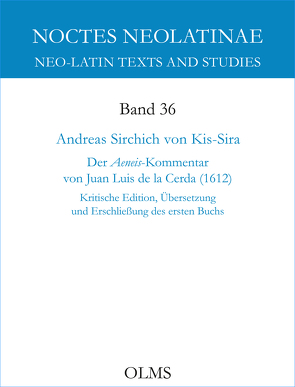
Am Ende einer Phase, in der für die Kommentierung antiker Texte die Grundlagenarbeit geleistet wird, auf die auch deren heutiges Verständnis noch aufbaut, verfasst der spanische Jesuit Juan Luis de la Cerda (1558–1643) den umfangreichsten Vergilkommentar aller Zeiten. In unglaublicher Fülle konzentriert er antikes Material, belegt darüber hinaus aber noch Deutungen unzähliger zeitgenössischer Autoren und setzt sich auch damit kritisch auseinander, was seine Arbeit zu einem unverzichtbaren Werkzeug der Vergilexegese macht.
Damals hochbedeutsam, heute weitgehend vergessen, lohnt eine Wiederentdeckung allemal: Anhand des prominentesten und meistgelesenen lateinischen Dichters, der schon fru¨h als Paradigma fu¨r eine Poetik aufgefasst worden ist, eröffnet die Untersuchung der Frage, was als kommentierungswürdig bzw. -bedürftig (oder gerade auch nicht) angesehen wird, einen tiefgreifenden Zugang zu einem Umgang mit dem Vergiltext, der sich von den modernen hermeneutischen Vorannahmen grundlegend unterscheidet.
Mit der Erschließung von la Cerdas Ausführungen zum ersten Buch der Aeneis macht diese zweisprachige Edition erstmals diesen Teil seines Werks und damit eine bedeutende Etappe der Vergilkommentierung zugänglich.****************At the close of an era, in which the foundations of the commentary tradition of ancient authors were laid, on which modern interpreters of these authors still continue to draw, the Spanish Jesuit Juan Luis de la Cerda (1558–1643) composed the most extensive Virgil commentary ever undertaken. He amassed an unrivalled collection of explanatory material from classical sources and took issue in great detail with the views and arguments of countless early modern commentators. The extraordinary breadth of his exegesis makes his commentary into a fundamental reference work even for present-day students of Virgil.
De la Cerda’s commentary was widely acclaimed in his own time, but has today largely fallen into oblivion. At the basis of this new analysis of his work lies the fundamental question what kind of interpretative issues and problems were considered indispensable in an early modern commentary on the most prominent and most-read ancient Latin poet, who served from very early on as a paradigm for the theory and practice of poetry. Special attention has been given to the differences between De la Cerda’s approach and the basic assumptions and preconceptions that inform the modern understanding of Virgil’s poetry.
This bilingual edition of De la Cerda’s commentary on Book 1 of Virgil’s Aeneid makes available for the first time this section of his exegetical work on Virgil in a state-of-the-art presentation.
Aktualisiert: 2023-06-29
> findR *
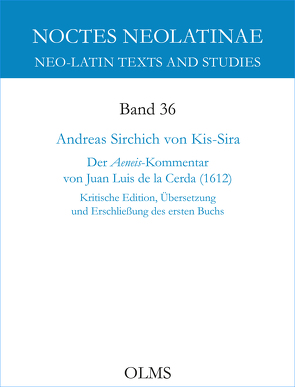
Am Ende einer Phase, in der für die Kommentierung antiker Texte die Grundlagenarbeit geleistet wird, auf die auch deren heutiges Verständnis noch aufbaut, verfasst der spanische Jesuit Juan Luis de la Cerda (1558–1643) den umfangreichsten Vergilkommentar aller Zeiten. In unglaublicher Fülle konzentriert er antikes Material, belegt darüber hinaus aber noch Deutungen unzähliger zeitgenössischer Autoren und setzt sich auch damit kritisch auseinander, was seine Arbeit zu einem unverzichtbaren Werkzeug der Vergilexegese macht.
Damals hochbedeutsam, heute weitgehend vergessen, lohnt eine Wiederentdeckung allemal: Anhand des prominentesten und meistgelesenen lateinischen Dichters, der schon fru¨h als Paradigma fu¨r eine Poetik aufgefasst worden ist, eröffnet die Untersuchung der Frage, was als kommentierungswürdig bzw. -bedürftig (oder gerade auch nicht) angesehen wird, einen tiefgreifenden Zugang zu einem Umgang mit dem Vergiltext, der sich von den modernen hermeneutischen Vorannahmen grundlegend unterscheidet.
Mit der Erschließung von la Cerdas Ausführungen zum ersten Buch der Aeneis macht diese zweisprachige Edition erstmals diesen Teil seines Werks und damit eine bedeutende Etappe der Vergilkommentierung zugänglich.****************At the close of an era, in which the foundations of the commentary tradition of ancient authors were laid, on which modern interpreters of these authors still continue to draw, the Spanish Jesuit Juan Luis de la Cerda (1558–1643) composed the most extensive Virgil commentary ever undertaken. He amassed an unrivalled collection of explanatory material from classical sources and took issue in great detail with the views and arguments of countless early modern commentators. The extraordinary breadth of his exegesis makes his commentary into a fundamental reference work even for present-day students of Virgil.
De la Cerda’s commentary was widely acclaimed in his own time, but has today largely fallen into oblivion. At the basis of this new analysis of his work lies the fundamental question what kind of interpretative issues and problems were considered indispensable in an early modern commentary on the most prominent and most-read ancient Latin poet, who served from very early on as a paradigm for the theory and practice of poetry. Special attention has been given to the differences between De la Cerda’s approach and the basic assumptions and preconceptions that inform the modern understanding of Virgil’s poetry.
This bilingual edition of De la Cerda’s commentary on Book 1 of Virgil’s Aeneid makes available for the first time this section of his exegetical work on Virgil in a state-of-the-art presentation.
Aktualisiert: 2023-06-29
> findR *
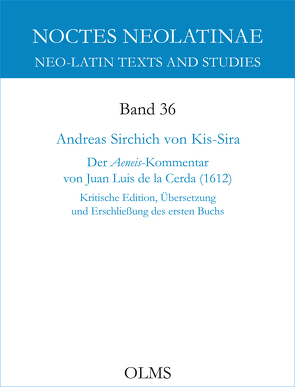
Am Ende einer Phase, in der für die Kommentierung antiker Texte die Grundlagenarbeit geleistet wird, auf die auch deren heutiges Verständnis noch aufbaut, verfasst der spanische Jesuit Juan Luis de la Cerda (1558–1643) den umfangreichsten Vergilkommentar aller Zeiten. In unglaublicher Fülle konzentriert er antikes Material, belegt darüber hinaus aber noch Deutungen unzähliger zeitgenössischer Autoren und setzt sich auch damit kritisch auseinander, was seine Arbeit zu einem unverzichtbaren Werkzeug der Vergilexegese macht.
Damals hochbedeutsam, heute weitgehend vergessen, lohnt eine Wiederentdeckung allemal: Anhand des prominentesten und meistgelesenen lateinischen Dichters, der schon fru¨h als Paradigma fu¨r eine Poetik aufgefasst worden ist, eröffnet die Untersuchung der Frage, was als kommentierungswürdig bzw. -bedürftig (oder gerade auch nicht) angesehen wird, einen tiefgreifenden Zugang zu einem Umgang mit dem Vergiltext, der sich von den modernen hermeneutischen Vorannahmen grundlegend unterscheidet.
Mit der Erschließung von la Cerdas Ausführungen zum ersten Buch der Aeneis macht diese zweisprachige Edition erstmals diesen Teil seines Werks und damit eine bedeutende Etappe der Vergilkommentierung zugänglich.****************At the close of an era, in which the foundations of the commentary tradition of ancient authors were laid, on which modern interpreters of these authors still continue to draw, the Spanish Jesuit Juan Luis de la Cerda (1558–1643) composed the most extensive Virgil commentary ever undertaken. He amassed an unrivalled collection of explanatory material from classical sources and took issue in great detail with the views and arguments of countless early modern commentators. The extraordinary breadth of his exegesis makes his commentary into a fundamental reference work even for present-day students of Virgil.
De la Cerda’s commentary was widely acclaimed in his own time, but has today largely fallen into oblivion. At the basis of this new analysis of his work lies the fundamental question what kind of interpretative issues and problems were considered indispensable in an early modern commentary on the most prominent and most-read ancient Latin poet, who served from very early on as a paradigm for the theory and practice of poetry. Special attention has been given to the differences between De la Cerda’s approach and the basic assumptions and preconceptions that inform the modern understanding of Virgil’s poetry.
This bilingual edition of De la Cerda’s commentary on Book 1 of Virgil’s Aeneid makes available for the first time this section of his exegetical work on Virgil in a state-of-the-art presentation.
Aktualisiert: 2021-04-22
> findR *
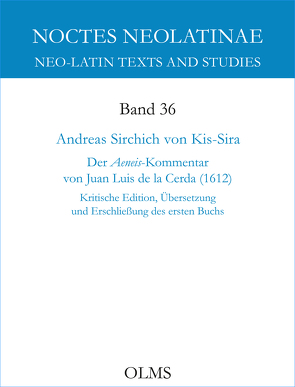
Am Ende einer Phase, in der für die Kommentierung antiker Texte die Grundlagenarbeit geleistet wird, auf die auch deren heutiges Verständnis noch aufbaut, verfasst der spanische Jesuit Juan Luis de la Cerda (1558–1643) den umfangreichsten Vergilkommentar aller Zeiten. In unglaublicher Fülle konzentriert er antikes Material, belegt darüber hinaus aber noch Deutungen unzähliger zeitgenössischer Autoren und setzt sich auch damit kritisch auseinander, was seine Arbeit zu einem unverzichtbaren Werkzeug der Vergilexegese macht.
Damals hochbedeutsam, heute weitgehend vergessen, lohnt eine Wiederentdeckung allemal: Anhand des prominentesten und meistgelesenen lateinischen Dichters, der schon fru¨h als Paradigma fu¨r eine Poetik aufgefasst worden ist, eröffnet die Untersuchung der Frage, was als kommentierungswürdig bzw. -bedürftig (oder gerade auch nicht) angesehen wird, einen tiefgreifenden Zugang zu einem Umgang mit dem Vergiltext, der sich von den modernen hermeneutischen Vorannahmen grundlegend unterscheidet.
Mit der Erschließung von la Cerdas Ausführungen zum ersten Buch der Aeneis macht diese zweisprachige Edition erstmals diesen Teil seines Werks und damit eine bedeutende Etappe der Vergilkommentierung zugänglich.****************At the close of an era, in which the foundations of the commentary tradition of ancient authors were laid, on which modern interpreters of these authors still continue to draw, the Spanish Jesuit Juan Luis de la Cerda (1558–1643) composed the most extensive Virgil commentary ever undertaken. He amassed an unrivalled collection of explanatory material from classical sources and took issue in great detail with the views and arguments of countless early modern commentators. The extraordinary breadth of his exegesis makes his commentary into a fundamental reference work even for present-day students of Virgil.
De la Cerda’s commentary was widely acclaimed in his own time, but has today largely fallen into oblivion. At the basis of this new analysis of his work lies the fundamental question what kind of interpretative issues and problems were considered indispensable in an early modern commentary on the most prominent and most-read ancient Latin poet, who served from very early on as a paradigm for the theory and practice of poetry. Special attention has been given to the differences between De la Cerda’s approach and the basic assumptions and preconceptions that inform the modern understanding of Virgil’s poetry.
This bilingual edition of De la Cerda’s commentary on Book 1 of Virgil’s Aeneid makes available for the first time this section of his exegetical work on Virgil in a state-of-the-art presentation.
Aktualisiert: 2020-07-01
> findR *
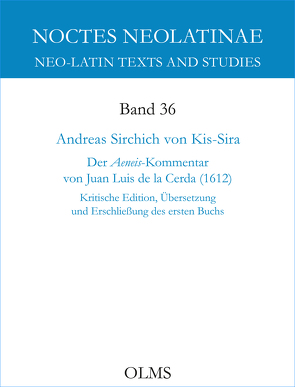
Am Ende einer Phase, in der für die Kommentierung antiker Texte die Grundlagenarbeit geleistet wird, auf die auch deren heutiges Verständnis noch aufbaut, verfasst der spanische Jesuit Juan Luis de la Cerda (1558–1643) den umfangreichsten Vergilkommentar aller Zeiten. In unglaublicher Fülle konzentriert er antikes Material, belegt darüber hinaus aber noch Deutungen unzähliger zeitgenössischer Autoren und setzt sich auch damit kritisch auseinander, was seine Arbeit zu einem unverzichtbaren Werkzeug der Vergilexegese macht.
Damals hochbedeutsam, heute weitgehend vergessen, lohnt eine Wiederentdeckung allemal: Anhand des prominentesten und meistgelesenen lateinischen Dichters, der schon fru¨h als Paradigma fu¨r eine Poetik aufgefasst worden ist, eröffnet die Untersuchung der Frage, was als kommentierungswürdig bzw. -bedürftig (oder gerade auch nicht) angesehen wird, einen tiefgreifenden Zugang zu einem Umgang mit dem Vergiltext, der sich von den modernen hermeneutischen Vorannahmen grundlegend unterscheidet.
Mit der Erschließung von la Cerdas Ausführungen zum ersten Buch der Aeneis macht diese zweisprachige Edition erstmals diesen Teil seines Werks und damit eine bedeutende Etappe der Vergilkommentierung zugänglich.****************At the close of an era, in which the foundations of the commentary tradition of ancient authors were laid, on which modern interpreters of these authors still continue to draw, the Spanish Jesuit Juan Luis de la Cerda (1558–1643) composed the most extensive Virgil commentary ever undertaken. He amassed an unrivalled collection of explanatory material from classical sources and took issue in great detail with the views and arguments of countless early modern commentators. The extraordinary breadth of his exegesis makes his commentary into a fundamental reference work even for present-day students of Virgil.
De la Cerda’s commentary was widely acclaimed in his own time, but has today largely fallen into oblivion. At the basis of this new analysis of his work lies the fundamental question what kind of interpretative issues and problems were considered indispensable in an early modern commentary on the most prominent and most-read ancient Latin poet, who served from very early on as a paradigm for the theory and practice of poetry. Special attention has been given to the differences between De la Cerda’s approach and the basic assumptions and preconceptions that inform the modern understanding of Virgil’s poetry.
This bilingual edition of De la Cerda’s commentary on Book 1 of Virgil’s Aeneid makes available for the first time this section of his exegetical work on Virgil in a state-of-the-art presentation.
Aktualisiert: 2020-07-19
> findR *
MEHR ANZEIGEN
Bücher zum Thema philologische Praxis
Sie suchen ein Buch über philologische Praxis? Bei Buch findr finden Sie eine große Auswahl Bücher zum
Thema philologische Praxis. Entdecken Sie neue Bücher oder Klassiker für Sie selbst oder zum Verschenken. Buch findr
hat zahlreiche Bücher zum Thema philologische Praxis im Sortiment. Nehmen Sie sich Zeit zum Stöbern und finden Sie das
passende Buch für Ihr Lesevergnügen. Stöbern Sie durch unser Angebot und finden Sie aus unserer großen Auswahl das
Buch, das Ihnen zusagt. Bei Buch findr finden Sie Romane, Ratgeber, wissenschaftliche und populärwissenschaftliche
Bücher uvm. Bestellen Sie Ihr Buch zum Thema philologische Praxis einfach online und lassen Sie es sich bequem nach
Hause schicken. Wir wünschen Ihnen schöne und entspannte Lesemomente mit Ihrem Buch.
philologische Praxis - Große Auswahl Bücher bei Buch findr
Bei uns finden Sie Bücher beliebter Autoren, Neuerscheinungen, Bestseller genauso wie alte Schätze. Bücher zum
Thema philologische Praxis, die Ihre Fantasie anregen und Bücher, die Sie weiterbilden und Ihnen wissenschaftliche
Fakten vermitteln. Ganz nach Ihrem Geschmack ist das passende Buch für Sie dabei. Finden Sie eine große Auswahl
Bücher verschiedenster Genres, Verlage, Autoren bei Buchfindr:
Sie haben viele Möglichkeiten bei Buch findr die passenden Bücher für Ihr Lesevergnügen zu entdecken. Nutzen Sie
unsere Suchfunktionen, um zu stöbern und für Sie interessante Bücher in den unterschiedlichen Genres und Kategorien
zu finden. Unter philologische Praxis und weitere Themen und Kategorien finden Sie schnell und einfach eine Auflistung
thematisch passender Bücher. Probieren Sie es aus, legen Sie jetzt los! Ihrem Lesevergnügen steht nichts im Wege.
Nutzen Sie die Vorteile Ihre Bücher online zu kaufen und bekommen Sie die bestellten Bücher schnell und bequem
zugestellt. Nehmen Sie sich die Zeit, online die Bücher Ihrer Wahl anzulesen, Buchempfehlungen und Rezensionen zu
studieren, Informationen zu Autoren zu lesen. Viel Spaß beim Lesen wünscht Ihnen das Team von Buchfindr.









